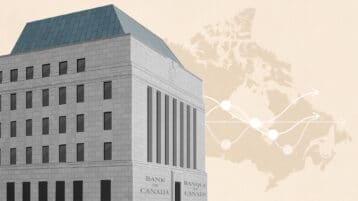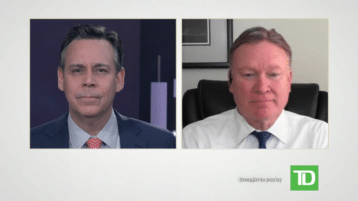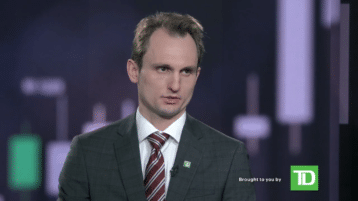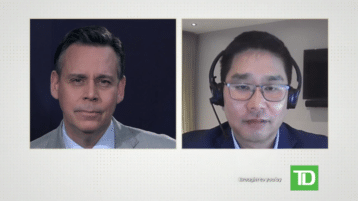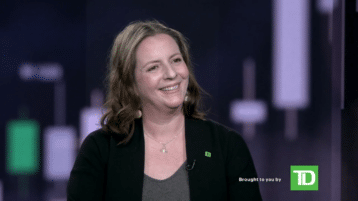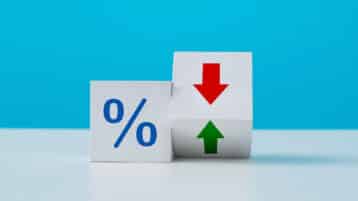Inflation in the U.S. is running at the highest level in a generation. Kim Parlee speaks to James Orlando, Senior Economist, TD Bank, about why wage growth expectations and other key indicators are validating a higher inflation outlook over the next few years.
Print Transcript
[MUSIC PLAYING]
- We all know inflation is running hot right now. I think we clocked 5.4% in June, which is the biggest year-over-year numbers we've seen since 2008. And again, we all talk about how it's transitory. And I guess transitory is in the eye of the beholder. What do you see right now?
- So thanks, Kim. Most economists out there, Federal Reserve included, they're saying that the really high inflation we have right now, the 4%, 5% inflation should ease off over the next little while because-- mostly because when you look at the economic data, when you look at the inflation data specifically and you see all of the underlying pieces of inflation, the prices of items that are really hot right now all have a fairly unsustainable pandemic impact going on them right now.
You look at, for example, travel. We've all been restricted with respect to being able to take that vacation we've been waiting for for a while. But now that we can, everyone's kind of rushing to demand the same sort of thing. So you look at airline tickets, hotel rooms, you look at even rental car prices. Even when I go on OpenTable and I try to book a restaurant reservation for myself, the bookings are all gone even for just the bar down the street. So we're in a situation where everyone's demanding the same sort of thing right now, because there's pent-up demand for it, and there's still limited supply.
And so the question for us is how long is this going to last for? How many vacations can you really take? And so, because of that, the expectation is that the really high demand we have right now is going to ease off a little bit and should move to more moderate inflation, is what we're calling it.
KIM PARLEE: That's a good analogy, although I would like to try and answer that question as to how many vacations I could take. But that's a different conversation. So I understand there's really two things you're watching to understand in terms of how you see this evolving. The first one is inflation expectations. And I think in your note you wrote, what to expect when you're expecting. And we're not talking about a baby here.
- No, no. We're not talking about a baby, but we're talking about a new experience in life. For most of the last decade or more, we've had disappointing inflation. And now we're dealing with high inflation. So the Federal Reserve was always saying for a long period of time that high inflation is just around the corner. And now they got it.
And so when we're looking at future inflation, there's a few factors that are pretty good indicators. And so we look first to businesses to see what businesses think about the high prices right now. And so we know businesses are saying, OK, my unit costs are increasing. My labor costs are increasing. Do I eat that cost right now, or do I pass that on to consumers? And so when we ask businesses about this, they're saying that we think those costs are going to keep rising, and we're planning to pass those costs on to consumers. So that's future inflation right there.
And then, when you go to consumer surveys and people like you and me, and we say, we're seeing high inflation right now. And yeah, we're biased to what's happened recently, but we're expecting high inflation to be passed on from businesses. But we're also expecting-- and this leads to the secondary factor of indicators. We're expecting our wages to increase in the future. And so that, in turn, is going to create somewhat of a circular impact on inflation.
KIM PARLEE: So it's interesting, I mean, when you talk about wages. And I've heard a lot about that. One thing that I really haven't heard a lot about is just what Delta, the variant, could mean for inflation. So I think about what you said earlier. The Delta variant is going to suppress demand a bit because if things have to stay shut down a little longer, but it's also going to muck up the supply again. So it's hitting on both sides. So do you have a sense of what that could mean?
- So the Delta variant or, say, even another variant that comes up, these are absolutely the number one risks on everyone's mind. And the reason is is that-- because our entire economic forecast, whether it be GDP, inflation, our view of an improving stock market or rising bond yields. All of this is based on the idea that the economic recovery, which is the strongest in generations, is going to continue relatively unscarred or unscathed from the Delta variant.
If there's a situation where economic growth is significantly negatively impacted, or you see a significant pullback in equity or equity prices, so a risk off move, this would absolutely change your economic forecast. And what happens is is that we usually see prices for a broad range of goods show disinflationary pressure. So weakening price pressures whenever we're in a recession or whenever we see lack of demand.
So if a lot of what's happening right now is due to heightened demand, then a setback in the economic outlook would absolutely lower prices. But if the setback results in reduced or an impact on supply, then we're going to be a situation where we might see this push and pull factor where some prices of some things are going up a lot, and some prices of other things are going down. So yeah, it's going to definitely jumble the entire inflation forecast if this is something that detrimentally impacts the overall economy.
- I've only got about 30 seconds here, James. But now that I've told you how hard it is, or you've told us how hard it is, to actually forecast, what is your forecast for inflation coming up?
- So as I'm mentioning, we're in a situation where we're pretty confident on the overall economic recovery. Obviously, the Delta variant is huge, but we look at continued economic growth. This recovery is so strong, Kim. We're looking at incredibly fast labor market growth.
And all of this is going to be putting up pressure on wages. It's going to be putting pressure on companies to pass through those higher wages on to-- as in higher inflation. So we think some of these transitory factors that we're talking about, yes, they're going to come off a little bit. But we think stronger underlying inflation is probably here to stay.
KIM PARLEE: James, always a pleasure. Thanks so much.
- Thank you.
[MUSIC PLAYING]
- We all know inflation is running hot right now. I think we clocked 5.4% in June, which is the biggest year-over-year numbers we've seen since 2008. And again, we all talk about how it's transitory. And I guess transitory is in the eye of the beholder. What do you see right now?
- So thanks, Kim. Most economists out there, Federal Reserve included, they're saying that the really high inflation we have right now, the 4%, 5% inflation should ease off over the next little while because-- mostly because when you look at the economic data, when you look at the inflation data specifically and you see all of the underlying pieces of inflation, the prices of items that are really hot right now all have a fairly unsustainable pandemic impact going on them right now.
You look at, for example, travel. We've all been restricted with respect to being able to take that vacation we've been waiting for for a while. But now that we can, everyone's kind of rushing to demand the same sort of thing. So you look at airline tickets, hotel rooms, you look at even rental car prices. Even when I go on OpenTable and I try to book a restaurant reservation for myself, the bookings are all gone even for just the bar down the street. So we're in a situation where everyone's demanding the same sort of thing right now, because there's pent-up demand for it, and there's still limited supply.
And so the question for us is how long is this going to last for? How many vacations can you really take? And so, because of that, the expectation is that the really high demand we have right now is going to ease off a little bit and should move to more moderate inflation, is what we're calling it.
KIM PARLEE: That's a good analogy, although I would like to try and answer that question as to how many vacations I could take. But that's a different conversation. So I understand there's really two things you're watching to understand in terms of how you see this evolving. The first one is inflation expectations. And I think in your note you wrote, what to expect when you're expecting. And we're not talking about a baby here.
- No, no. We're not talking about a baby, but we're talking about a new experience in life. For most of the last decade or more, we've had disappointing inflation. And now we're dealing with high inflation. So the Federal Reserve was always saying for a long period of time that high inflation is just around the corner. And now they got it.
And so when we're looking at future inflation, there's a few factors that are pretty good indicators. And so we look first to businesses to see what businesses think about the high prices right now. And so we know businesses are saying, OK, my unit costs are increasing. My labor costs are increasing. Do I eat that cost right now, or do I pass that on to consumers? And so when we ask businesses about this, they're saying that we think those costs are going to keep rising, and we're planning to pass those costs on to consumers. So that's future inflation right there.
And then, when you go to consumer surveys and people like you and me, and we say, we're seeing high inflation right now. And yeah, we're biased to what's happened recently, but we're expecting high inflation to be passed on from businesses. But we're also expecting-- and this leads to the secondary factor of indicators. We're expecting our wages to increase in the future. And so that, in turn, is going to create somewhat of a circular impact on inflation.
KIM PARLEE: So it's interesting, I mean, when you talk about wages. And I've heard a lot about that. One thing that I really haven't heard a lot about is just what Delta, the variant, could mean for inflation. So I think about what you said earlier. The Delta variant is going to suppress demand a bit because if things have to stay shut down a little longer, but it's also going to muck up the supply again. So it's hitting on both sides. So do you have a sense of what that could mean?
- So the Delta variant or, say, even another variant that comes up, these are absolutely the number one risks on everyone's mind. And the reason is is that-- because our entire economic forecast, whether it be GDP, inflation, our view of an improving stock market or rising bond yields. All of this is based on the idea that the economic recovery, which is the strongest in generations, is going to continue relatively unscarred or unscathed from the Delta variant.
If there's a situation where economic growth is significantly negatively impacted, or you see a significant pullback in equity or equity prices, so a risk off move, this would absolutely change your economic forecast. And what happens is is that we usually see prices for a broad range of goods show disinflationary pressure. So weakening price pressures whenever we're in a recession or whenever we see lack of demand.
So if a lot of what's happening right now is due to heightened demand, then a setback in the economic outlook would absolutely lower prices. But if the setback results in reduced or an impact on supply, then we're going to be a situation where we might see this push and pull factor where some prices of some things are going up a lot, and some prices of other things are going down. So yeah, it's going to definitely jumble the entire inflation forecast if this is something that detrimentally impacts the overall economy.
- I've only got about 30 seconds here, James. But now that I've told you how hard it is, or you've told us how hard it is, to actually forecast, what is your forecast for inflation coming up?
- So as I'm mentioning, we're in a situation where we're pretty confident on the overall economic recovery. Obviously, the Delta variant is huge, but we look at continued economic growth. This recovery is so strong, Kim. We're looking at incredibly fast labor market growth.
And all of this is going to be putting up pressure on wages. It's going to be putting pressure on companies to pass through those higher wages on to-- as in higher inflation. So we think some of these transitory factors that we're talking about, yes, they're going to come off a little bit. But we think stronger underlying inflation is probably here to stay.
KIM PARLEE: James, always a pleasure. Thanks so much.
- Thank you.
[MUSIC PLAYING]















